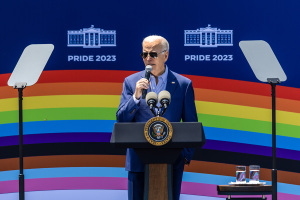Tom Hanks, NBA: World reacts to coronavirus by shutting down

Tom Hanks and his wife, Rita Wilson, have tested positive for coronavirus in Australia and are being treated. After Utah Jazz player Rudy Gobert also tested positive, the NBA suspended the season until further notice.
Last night, President Trump announced in a televised address from the Oval Office that the U.S. is suspending all travel from Europe to the U.S. for 30 days to slow the spread of the virus. He also announced economic measures to help employees and small businesses impacted by the disease.
All this after the World Health Organization declared coronavirus to be a global pandemic. Its director explained: “We’re deeply concerned both by the alarming levels of spread and severity, and by the alarming levels of inaction. We have rung the alarm bell loud and clear.”
More than 200 colleges have canceled in-person classes
One way people and companies around the world are responding to the coronavirus crisis is through “social distancing.”
The idea is to break potential chains of virus transmission by preventing infected people from coming in close contact with healthy people. The goal is to slow the spread of the virus, buying time for doctors to treat the flood of patients and researchers to develop vaccines and antiviral therapies. This can mean canceling conferences and events as well as encouraging people to avoid crowded public transportation, postpone weddings, and reschedule other gatherings.
For example, cities across the country have canceled their St. Patrick’s Day parades. The city of Austin canceled its South by Southwest festival.
The Democratic National Committee will hold its presidential debate this Sunday in Phoenix without a live audience. More than two hundred colleges (so far) have canceled in-person classes. The NCAA basketball tournaments will be played without fans in the stands.
However, low-wage workers such as janitors, food service workers, and retail cashiers cannot work remotely and face intense economic hardships. School closings are forcing parents, including vitally needed healthcare workers, to miss work to care for their children at home.
The line and the circle to the dot
Here’s the opportunity in the crisis: The isolation produced by social distancing and fear spawned by this pandemic is an invitation for Christians to demonstrate the power and relevance of Gospel-centered community.
When I taught philosophy of religion, we discussed the Western view of history as linear, with progress from the past to the future. By contrast, the Eastern view has typically been more cyclical, as seen in reincarnation motifs and seasonally centered worldviews.
Recent generations, however, have adopted a chaotic existentialist philosophy centered on the supremacy of the person. We have moved from the line and the circle to the dot.
Postmodern relativism has taught us that all truth claims are personal and subjective. The sexual revolution taught us that our bodies are our own to do with as we wish. We have redefined marriage according to subjective wishes rather than objective values. Some are livestreaming their abortions or suicides.
We now live in an individualistic, self-centered culture that is reaping what it has sown.
'That they may all be one'
By contrast, one of the most appealing aspects of early Christianity was its inclusive community. Jesus set the example with his outreach to Samaritans and Gentiles, lepers and tax collectors.
New believers from 13 different language groups made up the early Christian movement (cf. Acts 2:9–11). Then Philip led Samaritans and an Ethiopian to Christ (Acts 8). Then Peter led a Roman centurion and his Gentile family to Christ (Acts 11). Then Paul broke down the walls of exclusivity in his culture with his ringing proclamation: “There is neither Jew nor Greek, there is neither slave nor free, there is no male and female, for you are all one in Christ Jesus” (Galatians 3:28).
Such community was an answer to Jesus’ prayer for His followers “that they may all be one ... so that the world may believe that you have sent me” (John 17:21).
The greater our need, the greater our need for God
How can we answer our Lord’s prayer today?
One: Care for those at risk. It is estimated that approximately 25 million Americans are immunocompromised or otherwise at elevated risk from coronavirus. The other 300 million of us need to do all we can to protect and serve them. This is why handwashing, social distancing, and other tools are essential to stop the spread of the disease to those who can least withstand its effects. And it is why sharing Christ with those who need to hear the Gospel is especially urgent.
Two: Seek ways to build community. Even if you’re self-quarantined or asked to stay home from work or school, you can send emails and texts. You can make encouraging social media posts. You can tell people you’re praying for and with them. You can find ways to model the love of Jesus.
Three: Strengthen your community with your Father. The greater our need, the greater our need for God. This is a time to redouble our commitment to Bible study, prayer, and other spiritual disciplines. This is a time to meet the challenges of our day by using them to go deeper with God.
Dr. Seuss wrote: “To the world, you may be one person, but to one person, you may be the world.”
Who is your “one person” today?
This article was originally published at the Denison Forum.




























